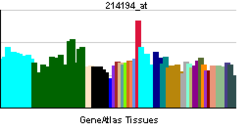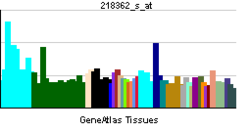- DIS3
-
Exosome complex exonuclease RRP44 or Dis3 is an enzyme that in humans is encoded by the DIS3 gene.[1][2] Its protein product is an RNase enzyme homologous to the yeast protein Rrp44, and can be part of the exosome complex in the nucleus of eukaryotic cells.[3][4]
References
- ^ Rozenblum E, Vahteristo P, Sandberg T, Bergthorsson JT, Syrjakoski K, Weaver D, Haraldsson K, Johannsdottir HK, Vehmanen P, Nigam S, Golberger N, Robbins C, Pak E, Dutra A, Gillander E, Stephan DA, Bailey-Wilson J, Juo SH, Kainu T, Arason A, Barkardottir RB, Nevanlinna H, Borg A, Kallioniemi OP (Apr 2002). "A genomic map of a 6-Mb region at 13q21-q22 implicated in cancer development: identification and characterization of candidate genes". Hum Genet 110 (2): 111–21. doi:10.1007/s00439-001-0646-6. PMID 11935316.
- ^ Shiomi T, Fukushima K, Suzuki N, Nakashima N, Noguchi E, Nishimoto T (Jul 1998). "Human dis3p, which binds to either GTP- or GDP-Ran, complements Saccharomyces cerevisiae dis3". J Biochem 123 (5): 883–90. PMID 9562621.
- ^ "Entrez Gene: DIS3 DIS3 mitotic control homolog (S. cerevisiae)". http://www.ncbi.nlm.nih.gov/sites/entrez?Db=gene&Cmd=ShowDetailView&TermToSearch=22894.
- ^ Tomecki et al.; Kristiansen, MS; Lykke-Andersen, S; Chlebowski, A; Larsen, KM; Szczesny, RJ; Drazkowska, K; Pastula, A et al. (2010). "The human core exosome interacts with differentially localized processive RNases: hDIS3 and hDIS3L.". The EMBO journal 29 (14): 2342–57. doi:10.1038/emboj.2010.121. PMC 2910271. PMID 20531386. http://www.pubmedcentral.nih.gov/articlerender.fcgi?tool=pmcentrez&artid=2910271.
Further reading
- Nakajima D, Okazaki N, Yamakawa H, et al. (2003). "Construction of expression-ready cDNA clones for KIAA genes: manual curation of 330 KIAA cDNA clones.". DNA Res. 9 (3): 99–106. doi:10.1093/dnares/9.3.99. PMID 12168954.
- Andersson B, Wentland MA, Ricafrente JY, et al. (1996). "A "double adaptor" method for improved shotgun library construction.". Anal. Biochem. 236 (1): 107–13. doi:10.1006/abio.1996.0138. PMID 8619474.
- Yu W, Andersson B, Worley KC, et al. (1997). "Large-scale concatenation cDNA sequencing.". Genome Res. 7 (4): 353–8. doi:10.1101/gr.7.4.353. PMC 139146. PMID 9110174. http://www.pubmedcentral.nih.gov/articlerender.fcgi?tool=pmcentrez&artid=139146.
- Nagase T, Ishikawa K, Suyama M, et al. (1999). "Prediction of the coding sequences of unidentified human genes. XIII. The complete sequences of 100 new cDNA clones from brain which code for large proteins in vitro.". DNA Res. 6 (1): 63–70. doi:10.1093/dnares/6.1.63. PMID 10231032.
- Brouwer R, Allmang C, Raijmakers R, et al. (2001). "Three novel components of the human exosome.". J. Biol. Chem. 276 (9): 6177–84. doi:10.1074/jbc.M007603200. PMID 11110791.
- Chen CY, Gherzi R, Ong SE, et al. (2002). "AU binding proteins recruit the exosome to degrade ARE-containing mRNAs.". Cell 107 (4): 451–64. doi:10.1016/S0092-8674(01)00578-5. PMID 11719186.
- Raijmakers R, Noordman YE, van Venrooij WJ, Pruijn GJ (2002). "Protein-protein interactions of hCsl4p with other human exosome subunits.". J. Mol. Biol. 315 (4): 809–18. doi:10.1006/jmbi.2001.5265. PMID 11812149.
- Raijmakers R, Egberts WV, van Venrooij WJ, Pruijn GJ (2002). "Protein-protein interactions between human exosome components support the assembly of RNase PH-type subunits into a six-membered PNPase-like ring.". J. Mol. Biol. 323 (4): 653–63. doi:10.1016/S0022-2836(02)00947-6. PMID 12419256.
- Scherl A, Couté Y, Déon C, et al. (2003). "Functional proteomic analysis of human nucleolus.". Mol. Biol. Cell 13 (11): 4100–9. doi:10.1091/mbc.E02-05-0271. PMC 133617. PMID 12429849. http://www.pubmedcentral.nih.gov/articlerender.fcgi?tool=pmcentrez&artid=133617.
- Strausberg RL, Feingold EA, Grouse LH, et al. (2003). "Generation and initial analysis of more than 15,000 full-length human and mouse cDNA sequences.". Proc. Natl. Acad. Sci. U.S.A. 99 (26): 16899–903. doi:10.1073/pnas.242603899. PMC 139241. PMID 12477932. http://www.pubmedcentral.nih.gov/articlerender.fcgi?tool=pmcentrez&artid=139241.
- Ota T, Suzuki Y, Nishikawa T, et al. (2004). "Complete sequencing and characterization of 21,243 full-length human cDNAs.". Nat. Genet. 36 (1): 40–5. doi:10.1038/ng1285. PMID 14702039.
- Dunham A, Matthews LH, Burton J, et al. (2004). "The DNA sequence and analysis of human chromosome 13.". Nature 428 (6982): 522–8. doi:10.1038/nature02379. PMC 2665288. PMID 15057823. http://www.pubmedcentral.nih.gov/articlerender.fcgi?tool=pmcentrez&artid=2665288.
- Lehner B, Sanderson CM (2004). "A protein interaction framework for human mRNA degradation.". Genome Res. 14 (7): 1315–23. doi:10.1101/gr.2122004. PMC 442147. PMID 15231747. http://www.pubmedcentral.nih.gov/articlerender.fcgi?tool=pmcentrez&artid=442147.
- Gerhard DS, Wagner L, Feingold EA, et al. (2004). "The status, quality, and expansion of the NIH full-length cDNA project: the Mammalian Gene Collection (MGC).". Genome Res. 14 (10B): 2121–7. doi:10.1101/gr.2596504. PMC 528928. PMID 15489334. http://www.pubmedcentral.nih.gov/articlerender.fcgi?tool=pmcentrez&artid=528928.
- Andersen JS, Lam YW, Leung AK, et al. (2005). "Nucleolar proteome dynamics.". Nature 433 (7021): 77–83. doi:10.1038/nature03207. PMID 15635413.
Categories:- Human proteins
- Chromosome 13 gene stubs
Wikimedia Foundation. 2010.


